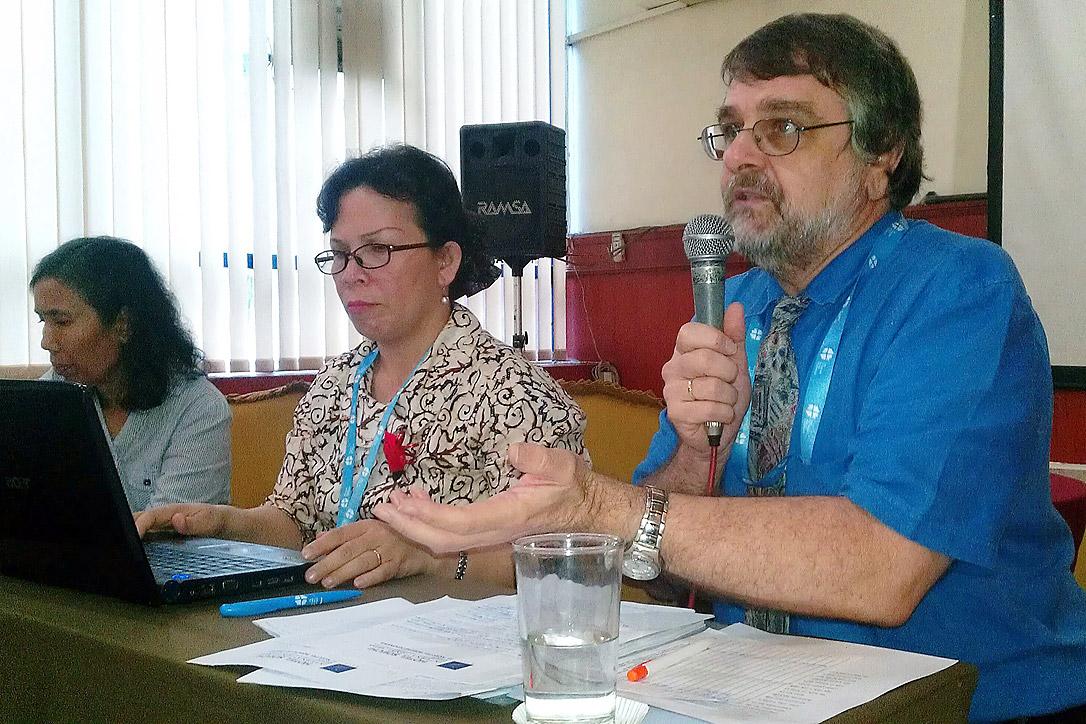Towards An Asian Lutheran Identity and Self-Understanding

Left to right: Indonesian pastors Rev. Basa Hutabarat and Rev. Dr Raulina Siagian during their presentation, moderated by Rev. Wolfgang Grieninger. Photo: LWF/S. Lawrence
By Steven Lawrence
The Lutheran World Federation (LWF)-led deliberations on the self-understanding and identity of Lutheranism in Asia continues, with participants in the last meeting affirming that the unity of Lutheran churches on the continent lies in accepting their differences and celebrating their diversity in the multi religious, multi-cultural and multi-linguistic context.
“There is no one common Lutheran identity in Asia and what unites Asian Lutherans are the core Lutheran teachings. The mission of the Asian Lutheran churches is to be a witness to the world guided by God’s love and the understanding of the theology of Cross,” theologians, church leaders, women and youth representatives emphasized in a statement at the end of the 17- 21 November conference held in Medan, Indonesia.
The conference was the third in the series organized by the LWF Department for Mission and Development (DMD) Asia Desk, and hosted by the LWF National Committee in Indonesia. The LWF Indonesian churches, representing over 6 million Lutherans, hosted the 30 participants from Cambodia, Hong Kong, India, Japan, Korea Malaysia, Singapore, Taiwan and Thailand.
In her presentation on the “Biblical Foundation of Lutheran Diakonia: Christian Service and the Increase of the Word of God,” Dr Po-Chu Groenvold, Lutheran Theological Seminary in Hong Kong, discussed the close relationship between Christian social service and God's mission. This topic was elaborated in group discussions, with emphasis that the spirituality of proclamation and diakonia is one of the visible identities of Lutheran churches in Asia.
Lutheran Teachings
Dr Jin-Seop Eom of Luther Seminary, Korea, explored the relationship between Western mission and indigenous assimilation, with specific reference to the Bible translation into vernacular languages and its impact on Asian/Korean context.
Participants heard how the Kinki Evangelical Lutheran Church in the search for its identity and theology took a bold stand to be self-reliant in 1996, and consequently set up a theology committee in 2014 to support the establishment of a church expressing an indigenous Lutheran stance both in its worship life and ministry. However, Dr Naoumi Eto from the Japan Lutheran College and Theological Seminary cautioned the participants about the growing impact of the so-called gospel of prosperity and its infiltration into the Lutheran church ministry in Asia.
In his presentation, the Principal of Sabah Theological Seminary Dr Wilfred John reiterated that the Bible will continue to remain a fundamental source for meaningful discussions on what is expressly understood and articulated in discussions on the definition of a Christian “family.” Noting that Lutheran identity in Asia was largely understood as a denominational identity and not so much as confessional identity, he argued for greater emphasis on Lutheran teachings in the Asian Lutheran churches in order to “reflect our confessinal identity.”
Dr Raulina Siagian of the Protestant Christian Batak Church (HKBP) expressed the struggle and initiatives of Indonesian churches to apply Lutheran teachings. From the Lutheran Church in Singapore, Darius Lee, a member of the LWF Global Young Reformers Network, suggested that the way forward for Asian Lutherans is to uphold the legacy of the Lutheran Reformers, which he described as an uncompromising commitment to the gospel.
Self-Identity of Believers
Bishop emeritus Busi Suneel Bhanu, a professor of religion, interfaith relations and Dalit theology at the Gurukul Lutheran Theological College and Research Institute in Chennai, reflected on his identity as a Dalit-Lutheran-Christian. He explained how Lutheranism has contributed to molding the self-identity of individual believers and faith communities amid increasing challenges of religious plurality, insurmountable social-cultural obstacles, political-economic apathy and the ever-perpetuating evil of caste discrimination in India.
The next regional meeting on Lutheran identity and self-understanding will be held in 2015.
Rev. Steven Lawrence is the regional expression officer for the LWF Asia region.



